Want to know more about the Best Genetics Schools In the US and make an informed decision? Here is a good place to start.
Are you passionate about genetics and considering pursuing a degree in this field? If so, you’re in luck! The United States is home to some of the best genetics programs in the world.
From Ivy League schools to public universities, these institutions offer a wide range of programs and specializations to suit every student’s needs. In this blog post, we will be exploring the top genetics schools in the US.
We’ll take a look at the best undergraduate and graduate programs, research institutions, and specialized programs.
Join us as we dive into the world of genetics and discover the best schools the US has to offer.
Please note that the order in this list might vary by ranking criteria and sources. Please see our criteria at the bottom.
Table of Contents
#25. Wake Forest University

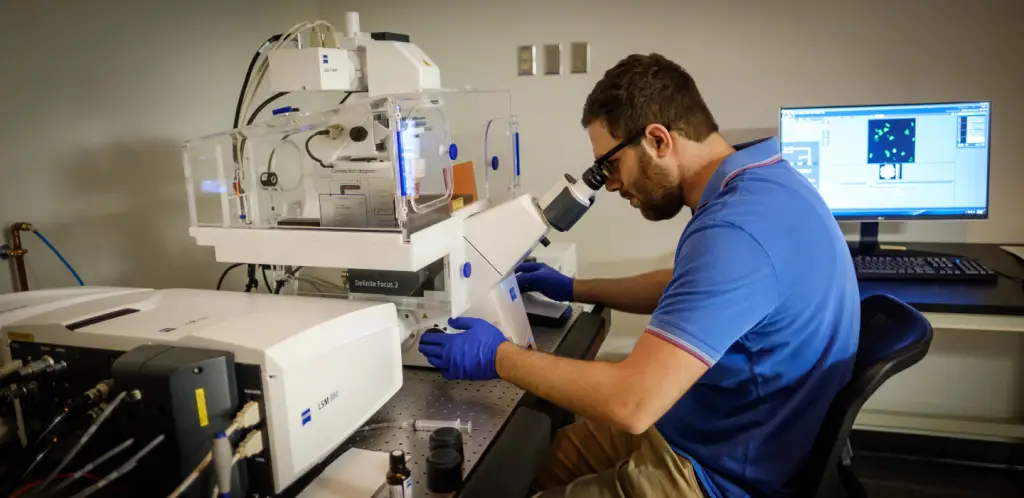
- Acceptance rate:25.2%
- Average entry score: 1350-1500 SAT or 30-33 ACT
- Student-to-faculty ratio:11:1
- Estimated cost of attendance (tuition and fees): $81,856
- Average earning potential for graduates: $58,200 (College Simply)
Located in Winston-Salem, North Carolina, Wake Forest University is a private school that offers both undergraduate and graduate degrees in the field of genetics. The genetics program at Wake Forest University is for students who want to pursue careers in research, medicine, or industry.
Wake Forest’s genetics department tailored their curriculum to focus on foundational knowledge of genetics and related disciplines, including biochemistry and molecular biology. Students learn how to evaluate scientific evidence, conduct experiments and apply their knowledge to real-world scenarios.
At Wake Forest University, you will have the opportunity to participate in research and internship opportunities. You can also take advantage of the on-campus laboratories, which are equipped with cutting-edge technology.
#24. Rutgers University


- Acceptance rate: 68.2%
- Average entry score: 1180-1410 SAT or 25-32 ACT
- Student-to-faculty ratio: 15:1
- Estimated cost of attendance (tuition and fees): $35,049-$52,250
- Average earning potential for graduates: $30,538 (College Factual)
Rutgers University offers a number of programs in genetics, including bachelor’s and master’s degrees. The school is one of the largest public research universities in the U.S., with more than 20 research centers.
In addition to its main campus in New Brunswick, New Jersey, Rutgers University has several additional campuses throughout the state and online programs. The Department of Genetics at Rutgers is home to some of the world’s leading geneticists who have made groundbreaking discoveries about everything from cancer treatment to aging processes.
Rutgers University students may take advantage of the genetics department’s good relationship with the Human Genetics Institute of New Jersey. This institute is the only one of its kind in the state and focuses on research, prevention, diagnosis, and treatment related to genetic diseases.
#23. University of Chicago
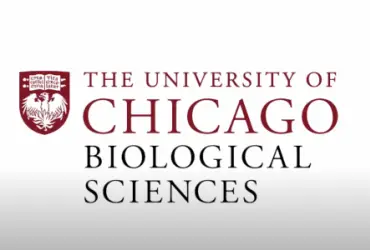
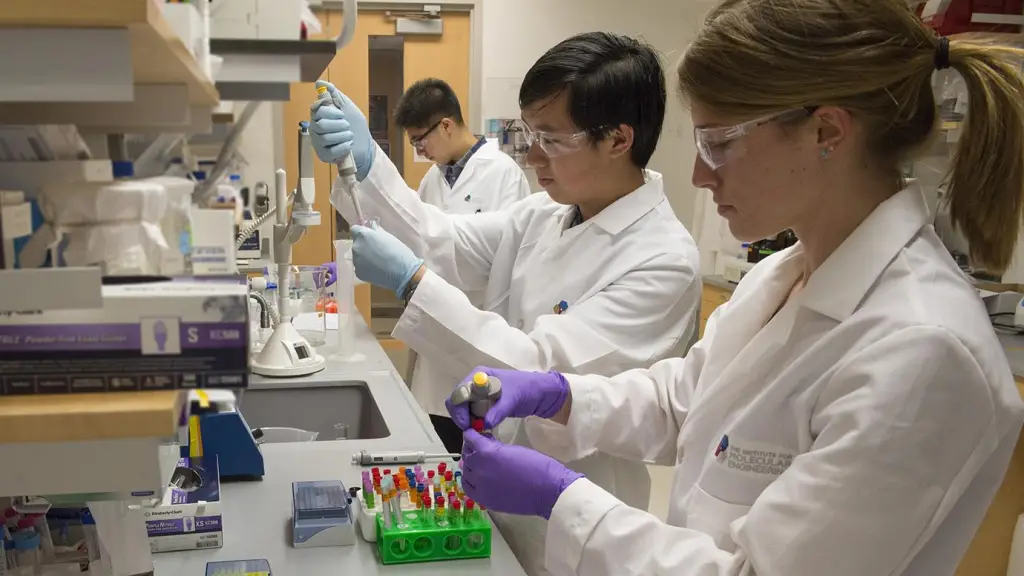
- Acceptance rate: 6.5%
- Average entry score: 1510-1580 SAT or 33-35 ACT
- Student-to-faculty ratio: 5:1
- Estimated cost of attendance (tuition and fees): $85,536
- Average earning potential for graduates: $75,200 (College Simply)
The University of Chicago is home to one of the most prestigious genetics programs in the country. Through the Department of Human Genetics, the school offers both undergraduate and graduate degrees in genetics.
Undergraduate students can choose from several different tracks, including human biology, molecular genetics, biochemistry, and genomics. Graduate students can earn either a Ph.D. or M.D./Ph.D., which often leads to careers in research and clinical medicine fields.
The University of Chicago’s Department of Human Genetics also offers a wide range of educational programs and resources for both professionals and students. This department offers several seminars and lectures each year, which are open to the public.
#22. University of Florida


- Acceptance rate: 30.5%
- Average entry score: 1300-1470 SAT or 29-33 ACT
- Student-to-faculty ratio: 18:1
- Estimated cost of attendance (tuition and fees): $21,430-$43,708
- Average earning potential for graduates: $62,600 (College Simply)
The University of Florida is a public research university located in Gainesville, Florida. This university offers both undergraduate and graduate degrees in genetics. The Genetics Institute at the University of Florida promotes research and education in genetics, genomics, and medicine.
At the Genetics Institute, researchers study a range of topics such as aging and longevity, cancer, neurodegenerative diseases, and many more. The Genetics Institute is also involved in the development of new technologies for genetic diagnosis, gene therapy, stem cell biology, and genome sequencing.
With cutting-edge facilities, the University of Florida is one of the best universities in genetics. The program is supported by a network of researchers from different departments and colleges at the university, providing a strong foundation for continued research.
Similar articles like this:
#21. The University of Illinois Urbana-Champaign


- Acceptance rate: 59.7%
- Average entry score: 1210-1470 SAT or 27-33 ACT
- Student-to-faculty ratio: 21:1
- Estimated cost of attendance (tuition and fees): $33,060-$50,510
- Average earning potential for graduates: $49,000 (College Simply)
The University of Illinois Urbana-Champaign is one of the best universities in genetics. This university has a strong history in genetics research. It is home to many world-renowned geneticists and researchers.
The program at the University of Illinois Urbana-Champaign is housed in the School of Molecular and Cell Biology. This provides opportunities for students to work with faculty members from other departments within the college.
The Genetics faculty at the university provides support for both undergraduate and graduate students. Students can get involved in research projects through clubs, which are open to all majors across campus. Genetics Clubs host many events throughout the year, including a genetics fair, genetics trivia nights and more.
#20. Emory University
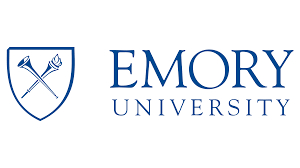
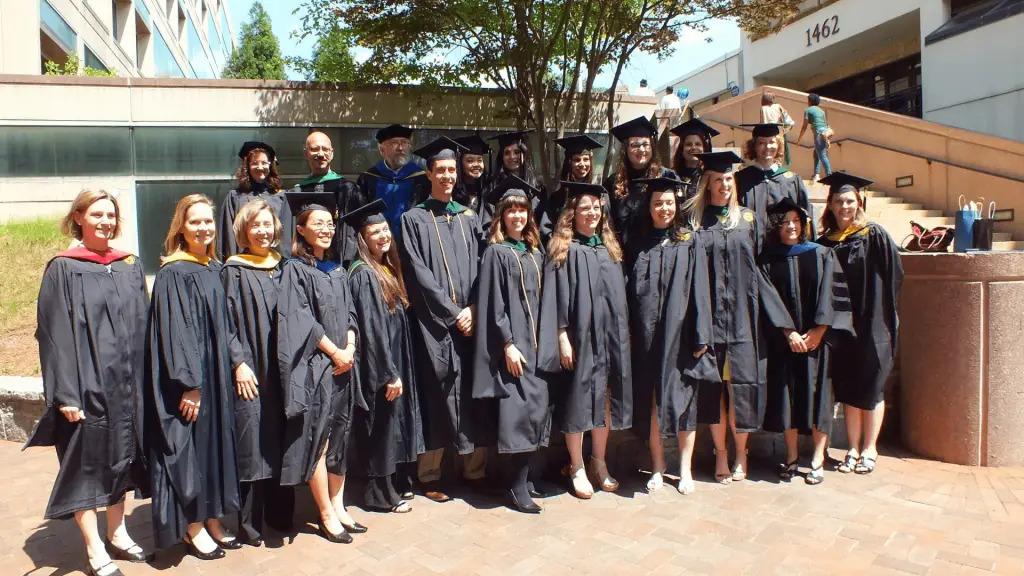
- Acceptance rate: 13.1%
- Average entry score: 1420-1540 SAT or 32-34 ACT
- Student-to-faculty ratio: 9:1
- Estimated cost of attendance (tuition and fees): $75,594
- Average earning potential for graduates: $54,600 (College Simply)
Housed at the School of Medicine, the Department of Human Genetics at Emory University offers a wide range of courses that are open to undergraduates. The department has a strong focus on research, with opportunities for undergraduate students to get involved in projects and gain experience working with faculty members.
This Georgia-based university has a long history of educating future leaders in the field of genetics, including notable alumni like Robert C. Green. The Department of Human Genetics is equipped with state-of-the-art equipment and facilities, including a biology lab that boasts powerful DNA sequencing machines.
Emory Genetics Laboratory provides students with a hands-on learning experience, giving them a chance to conduct experiments and analyze data as part of their coursework. This facility is considered one of the best research labs in the region.
#19. Case Western Reserve University


- Acceptance rate: 30.2%
- Average entry score: 1420-1510 SAT or 32-35 ACT
- Student-to-faculty ratio: 9:1
- Estimated cost of attendance (tuition): $62,234
- Average earning potential for graduates: $68,000 (College Simply)
The School of Medicine at Case Western Reserve University is home to the department of genetics and genome sciences. This department offers a variety of programs and courses, including a graduate program in medical genetics.
Other than world-class facilities, Case Western Reserve University boasts a top-notch faculty of researchers. According to education statistics, this university has been consistently ranked among the top universities in the U.S. for its graduate programs in life sciences and medicine.
At Case Western Reserve University, you can expect to work alongside some of the most distinguished names in medicine and research. It is also worth noting that Case Western Reserve University has one of the most competitive admissions rates in the country.
#18. University of California–Davis

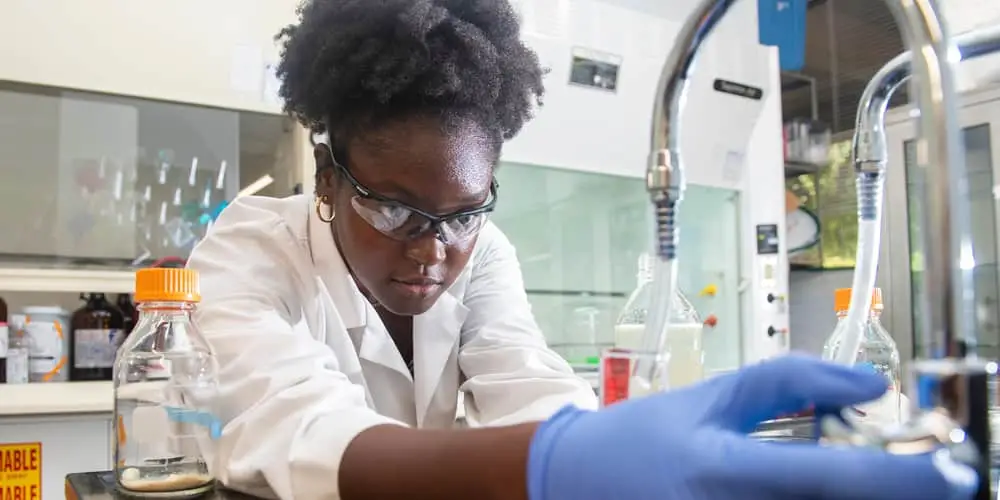
- Acceptance rate: 48.8%
- Average entry score: 1160-1400 SAT
- Student-to-faculty ratio: 21:1
- Estimated cost of attendance (tuition and fees): $37,122-$66,876
- Average earning potential for graduates: $33,400 (College Simply)
The University of California–Davis has an excellent reputation for its programs in genetics, genomics, and medicine. Majors in these areas study how genes change during the course of human development and how this affects our health.
Students have access to facilities that are among the most advanced in the world. The university has a long history of helping to identify and develop ways to prevent and treat disease. Study at an institution that is committed to improving the human condition through science.
Similar articles like this:
#17. University of Rochester
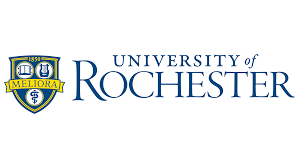

- Acceptance rate: 40.5%
- Average entry score: 1370-1520 SAT or 31-35 ACT
- Student-to-faculty ratio: 9:1
- Estimated cost of attendance (tuition and fees): $82,468
- Average earning potential for graduates: $46,500 (College Simply)
University of Rochester is a private, nonprofit, research-intensive university. The school has a reputation for excellence in academics, especially in the fields of medicine and law. Students may choose from more than 200 majors and programs at the undergraduate level and more than 100 graduate degrees at the master’s and doctoral levels.
The Department of Biomedical Genetics, located in the School of Medicine and Dentistry, is a leader in the field of human genetic disease research. This department is home to faculty who study a variety of diseases, including cancer, diabetes, hereditary disorders, and autoimmune diseases.
Students benefit from the close relationships that faculty members have with both their students and colleagues. These relationships foster a collaborative environment in which students are encouraged to become independent researchers who will eventually pursue careers as academic or clinical scientists.
#16. North Carolina State University


- Acceptance rate: 47.5%
- Average entry score: 1250-1420 SAT or 27-32 ACT
- Student-to-faculty ratio: 15:1
- Estimated cost of attendance (tuition and fees): $24,986-$45,771
- Average earning potential for graduates: $42,800 (College Simply)
This is a land-grant university with a mission to conduct high-quality research, offers undergraduate and graduate education to the North Carolina public and beyond.
The Department of Biological Sources offers a variety of majors and minors in the biological sciences. Genetics students will learn about the structure, function, and evolution of genomes. They also study how we can apply these principles to understand the genetic basis of traits in humans and other organisms.
As a department committed to providing students with a high-quality education, North Carolina State University is constantly striving to find new ways to improve the learning experience for our students.
The institution believes that by fostering a collaborative environment, they can provide students with resources to help them succeed in their academic and professional careers.
#15. Clemson University

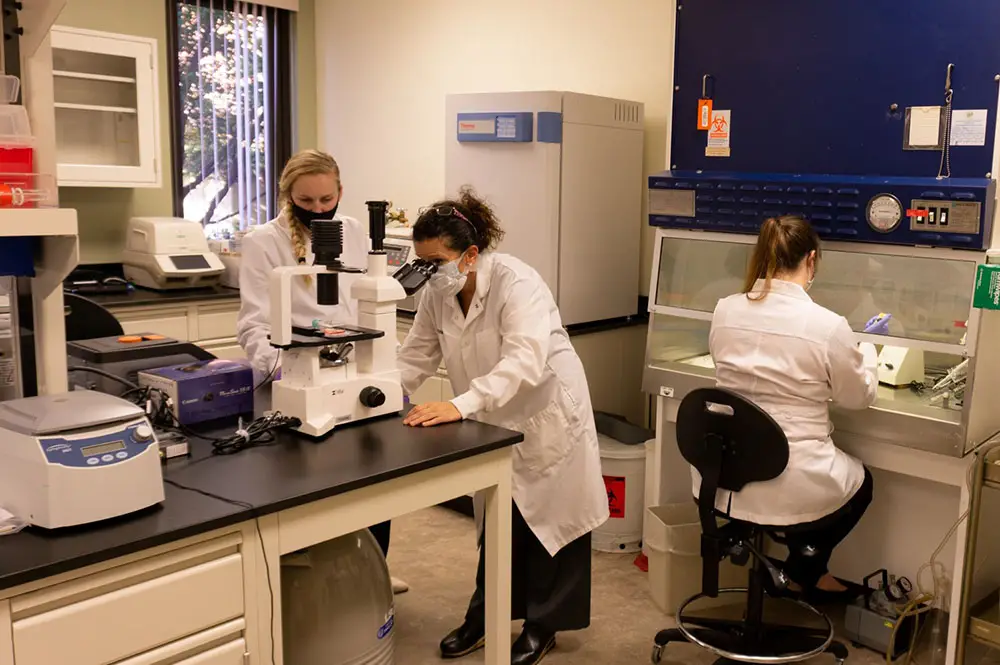
- Acceptance rate: 49.2%
- Average entry score: 1230-1400 SAT or 27-32 ACT
- Student-to-faculty ratio: 18:1
- Estimated cost of attendance (tuition and fees): $34,096-$57,088
- Average earning potential for graduates: $28,199 (College Factual)
Located in Clemson, South Carolina, prides itself on being an institution where people from all backgrounds can come together to learn and grow. This university has a variety of resources to help students succeed, including an academic support system that provides tutoring and mentorship opportunities for students.
This way, Clemson University is able to help students reach their full potential and achieve their goals. The school also offers a variety of programs for every qualified genetics major looking for affordable education, including scholarships and grants that cover tuition costs.
The Department of Genetics and Biochemistry at Clemson University is also one of the most diverse and innovative departments in the country.
Its researchers in this department are dedicated to creating solutions for some of humanity’s biggest challenges, including fighting disease, improving food security and developing technologies that will help people live healthier lives.
#14. Purdue University

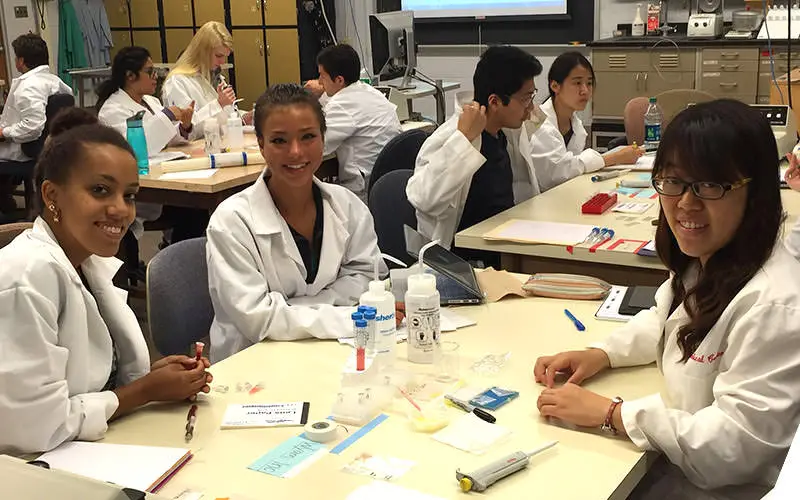
- Acceptance rate: 25%
- Average entry score: 1267 SAT
- Student-to-faculty ratio: 14:1
- Estimated cost of attendance (tuition and fees): $24,390-$50,000
- Average earning potential for graduates: $39,698 (College Factual)
Purdue University is a world-class research university with a mission to advance knowledge and create solutions that benefit society. This institution, through its Department of Biological Sciences, is one of the leading institutions in the world for biological research.
Its scientists and students are passionate about making discoveries that can improve lives and help people live healthier, longer lives.
The university’s vast resources and top-notch facilities will allow you to learn and grow as a scientist. With so many opportunities at your fingertips, it’s no wonder that Purdue University is one of the most popular schools for premed students.
Similar articles like this:
- 25 Best Dental Schools In The US
- 25 Best Schools For Geology In The US
- 25 Best Schools For Marine Biology In The US
#13. University of North Carolina at Chapel Hill
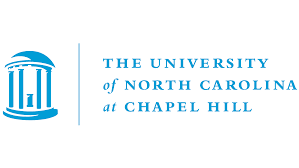

- Acceptance rate: 20.4%
- Average entry score: 1310-1500 SAT or 29-33 ACT
- Student-to-faculty ratio: 13:1
- Estimated cost of attendance (tuition and fees): $24,546-$51,725
- Average earning potential for graduates: $48,600 (College Simply)
The University of North Carolina at Chapel Hill is one of the top public research universities in the United States. It’s located in the heart of North Carolina’s Research Triangle, an area that also includes Duke University and North Carolina State University.
Therefore, you’ll have access to many opportunities for hands-on research with some of the world’s leading scientists.
The institution’s Department of Genetics is a highly-regarded and well-funded department. The university offers a wide variety of undergraduate and graduate programs in genetics, including applied genetics and genomics.
One of the best things about studying genetics at UNC is that you’ll be surrounded by talented faculty and students who are passionate about their research. The university has a long history of successful alumni, meaning networking opportunities are plentiful after graduation.
#12. Washington University in St. Louis


- Acceptance rate: 13%
- Average entry score: 1490-1570 SAT or 33-35 ACT
- Student-to-faculty ratio: 7:1
- Estimated cost of attendance (tuition and fees): $79,060
- Average earning potential for graduates: $30,000 (College Factual)
The Department of Genetics at Washington University in St. Louis is one of the best genetics departments in the country. This department draws its strength from a highly-skilled faculty, an outstanding group of graduate students, and dedicated undergraduate researchers.
Washington University offers a wide variety of undergraduate and graduate programs in genetics. Students learn in an environment that is both challenging and supportive, with opportunities to conduct cutting-edge research in a wide range of topics.
The department has a history of graduating students who go on to do successful careers. Washington University’s location in St. Louis, Missouri, offers beautiful views of the Mississippi River and easy access to many cultural attractions.
#11. Iowa State University


- Acceptance rate: 91.1%
- Average entry score: 1010-1310 SAT or 21-28 ACT
- Student-to-faculty ratio: 18:1
- Estimated cost of attendance (tuition and fees): $21,940-$37,128
- Average earning potential for graduates: $30,800 (College Simply)
The Department of Genetics, Development, and Cell Biology at Iowa State University is an interdisciplinary department that offers students a chance to study biology from many different perspectives. The department has research facilities for studying everything from the environment to cells and plants.
Genetics students study the structure and function of genes, as well as their role in inheritance. They may also learn about the development of organisms from fertilization to birth and death. This department teaches students how to think critically about biology so they learn how to apply their knowledge outside the classroom as well.
#10. Cornell University
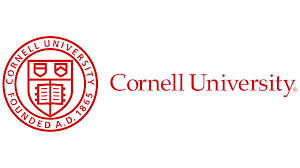
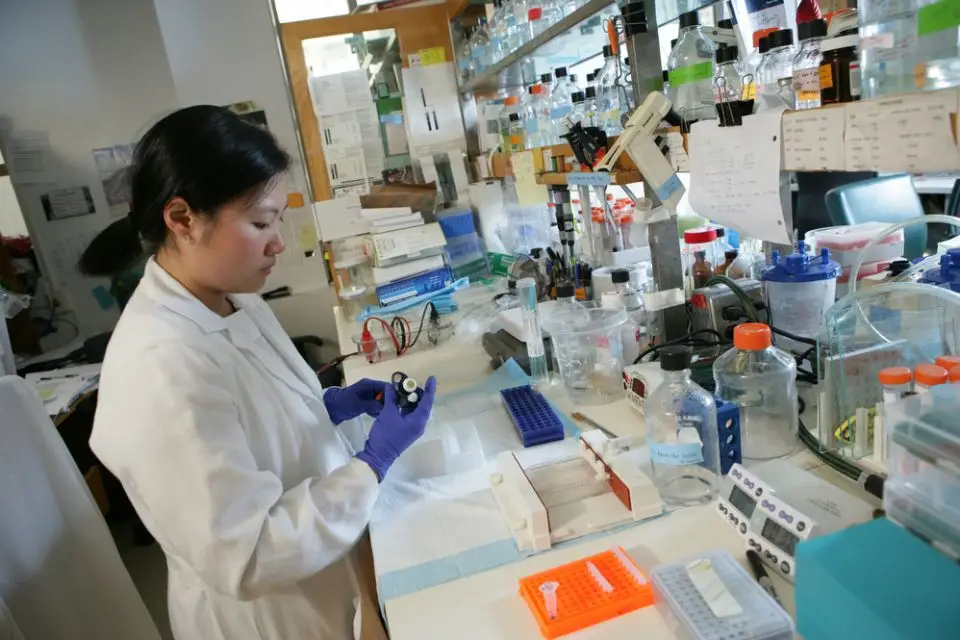
- Acceptance rate: 11%
- Average entry score: 1450-1560 SAT or 33-35 ACT
- Student-to-faculty ratio: 9:1
- Estimated cost of attendance (tuition and fees): $78,992
- Average earning potential for graduates: $32,800 (College Simply)
Cornell University is a private research university located in Ithaca, New York. Cornell is a member of the Ivy League and has been ranked as one of the best schools for its undergraduate programs.
The Department of Molecular Biology and Genetics promotes research and provides courses for graduate students, postdoctoral fellows and undergraduates.
These programs prepare students for careers in the life sciences and related fields. The department has two main goals: to advance research in molecular biology and to provide the next generation of biologists with the skills they need to succeed in their chosen fields.
Similar articles like this:
- 25 Best Schools For Agricultural Sciences In The US
- 25 Best Schools For Renewable Energy Degrees In The US
- 25 Best Engineering Schools In The US
#9. University of Georgia–Athens

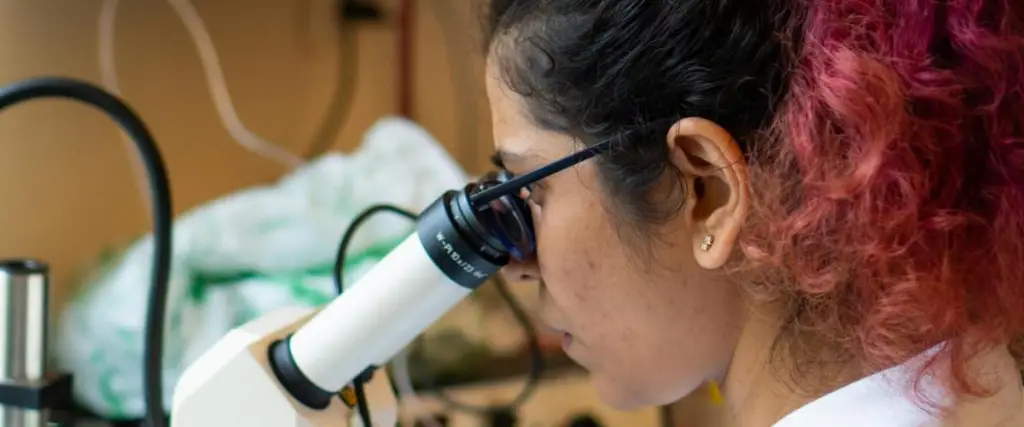
- Acceptance rate: 40%
- Average entry score: 1270-1450 SAT or 29-33 ACT
- Student-to-faculty ratio: 17:1
- Estimated cost of attendance (tuition and fees): $27,958-$46,998
- Average earning potential for graduates: $42,800 (College Simply)
Genetics is a rapidly growing field, which means there are many opportunities for students to enter the workforce upon graduation.
The UGA genetics program is known for its hands-on approach to learning, which gives students plenty of opportunities for real-world experience in labs across the Athens campus.
UGA provides a wealth of resources for students interested in genetics. This includes a library of over 1 million books and journals, as well as a collection of databases with access to the latest research findings.
#8. University of Michigan–Ann Arbor
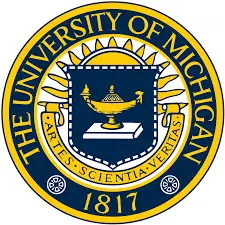

- Acceptance rate: 20.2%
- Average entry score: 1360-1530 SAT or 31-35 ACT
- Student-to-faculty ratio: 15:1
- Estimated cost of attendance (tuition and fees): $32,272-$69,326
- Average earning potential for graduates: $28,400 (College Simply)
The Department of Genetics at the University of Michigan–Ann Arbor houses a variety of resources for students interested in genetics. The department has state-of-the-art equipment and facilities that allow students to perform experiments and conduct research on campus.
Students also have access to a wide range of courses and labs that are dedicated to genetics. The department offers undergraduate, graduate, and Ph.D. degrees in the field.
This gives students the opportunity to pursue their interests in a variety of ways, whether they are interested in pursuing research or working with patients.
The department’s experienced faculty is available to provide students with guidance and advice throughout their time at the university.
#7. Harvard University
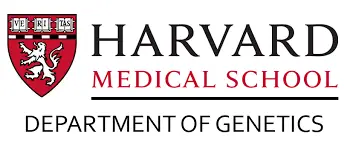
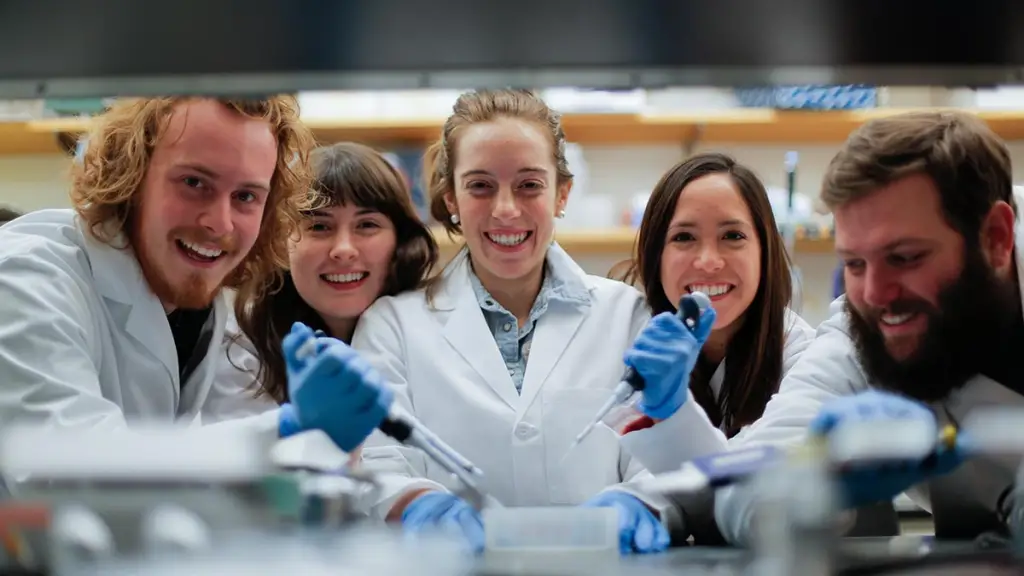
- Acceptance rate: 4%
- Average entry score: 1460-1580 SAT or 33-35 ACT
- Student-to-faculty ratio: 7:1
- Estimated cost of attendance (tuition and fees): $78,200
- Average earning potential for graduates: $48,200 (College Simply)
Located at the Harvard Medical School, the Department of Genetics is a leader in research and training. The department offers opportunities for undergraduate, graduate and medical students to participate in cutting-edge research projects that focus on human genetics, developmental biology, cell biology and systems biology.
Its faculty members are also actively involved in biomedical research at Harvard’s affiliated hospitals
Harvard University is the place to be if you are looking for a top-notch education. The university has a reputation for having one of the most competitive admissions processes in the world. Although it’s expensive to attend, a Harvard degree can open the doors to some of the best jobs in the world.
What’s it like to study at Harvard University?
#6. Vanderbilt University


- Acceptance rate: 7.1%
- Average entry score: 1480-1570 SAT or 34-35 ACT
- Student-to-faculty ratio: 8:1
- Estimated cost of attendance (tuition and fees): $79,558
- Average earning potential for graduates: $45,000 (College Factual)
Vanderbilt is a private research university located in Nashville, Tennessee. This institution is consistently ranked among the top universities in America. The university’s faculty members are known for their dedication to research and innovation.
As a pioneer in genetics research, Vanderbilt’s Division of Medical Genetics and Genomic Medicine is a world-renowned leader in the field of genetic research. The university has an extensive history of investing in students, including offering a number of scholarships and financial aid options.
Therefore, Vanderbilt University is a decent option for genetics research. Students who are interested in applying to this institution should keep reading for more information about its academic programs, admission requirements and financial aid opportunities.
What’s it like to study molecular genetics at Vanderbilt University?
Similar articles like this:
- 25 Best Forestry Schools In The US
- 25 Best Schools For Environmental Science In The US
- 25 Best Schools For Health Sciences Degrees In The US
#5. University of Wisconsin–Madison


- Acceptance rate: 60.4%
- Average entry score: 1300-1480 SAT or 28-32 ACT
- Student-to-faculty ratio: 18:1
- Estimated cost of attendance (tuition and fees): $27,484-$55,372
- Average earning potential for graduates: $33,912 (College Factual)
The University of Wisconsin–Madison (also known as UW) is a public research university located in Madison, Wisconsin. This school offers genetics programs to both agriculture and medicine students.
With cutting-edge research facilities, this university is an ideal place for students to pursue genetics research. The university offers a Bachelor of Science in Genetics and Genomics, which provides students with a foundational knowledge of genetics and its applications.
This program is designed for students who plan to pursue careers in research or medicine. UW also offers advanced options for students who plan to pursue careers in genetics research. These advanced degrees include Master of Science and Doctor of Philosophy degrees.
What’s it like to study genetics at the University of Wisconsin, Madison?
#4. Yale University

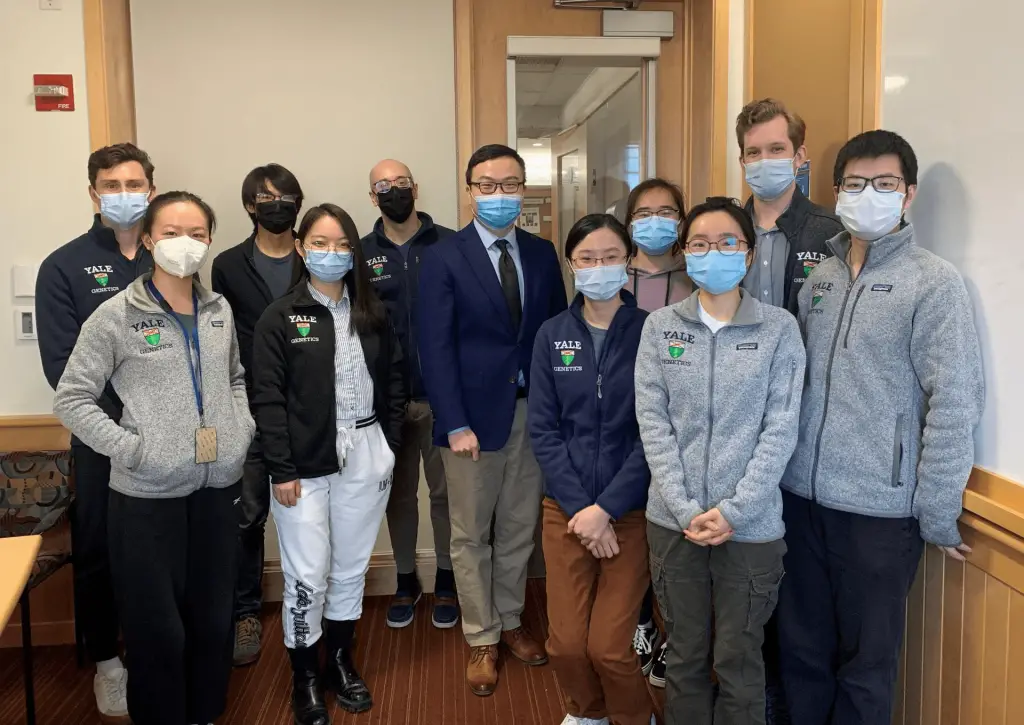
- Acceptance rate: 5.3%
- Average entry score: 33-35 ACT
- Student-to-faculty ratio: 6:1
- Estimated cost of attendance (tuition and fees): $84,525
- Average earning potential for graduates: $74,600 (After 6 years, College Simply)
Yale University is a private research university located in New Haven, Connecticut. It is one of the most prestigious universities in the U.S., having been ranked as one the best schools by U.S News & World Report and Forbes.
The university offers a variety of undergraduate and graduate programs in the field of genetics. Undergraduate students can major in genetics or biochemistry, while graduate students have the option of pursuing an M.S., or Ph.D. degree in this field.
The genetics department at Yale University offers a variety of research opportunities for undergraduate and graduate students. The department has over 30 faculty members with expertise in various fields of genetics, including cancer biology, developmental biology, bioinformatics, human genetics and population genetics.
What’s it like to study at Yale University?
#3. Johns Hopkins University


- Acceptance rate: 7.5%
- Average entry score: 1510-1570 SAT or 34-35 ACT
- Student-to-faculty ratio: 7:1
- Estimated cost of attendance (tuition and fees): $78,657
- Average earning potential for graduates: $68,300 (After 6 years, College Simply)
Located in Baltimore, Maryland, Johns Hopkins University offers undergraduate and graduate programs in the field of genetics. The department of molecular biology and genetics offers a variety of research opportunities for undergraduate students who are interested in becoming geneticists or biologists.
This department also offers graduate programs leading to either an M.S. or Ph.D. degree in the field of genetics.
With its long history of excellence, Johns Hopkins University is one of the top universities in the country. The institution has also produced many renowned scientists who have made significant contributions to the field of genetics through their research and discoveries.
What’s it like to study at Johns Hopkins University?
#2. Duke University


- Acceptance rate: 5.9%
- Average entry score: 1480-1570 SAT or 33-35 ACT
- Student-to-faculty ratio: 8:1
- Estimated cost of attendance (tuition and fees): $84,517
- Average earning potential for graduates: $88,200 (After 6 years, College Simply)
Duke is another top-notch university in the United States. The institution offers a variety of undergraduate and graduate programs in genetics, including a bachelor’s degree in cell and molecular biology, master’s degrees in human genetics and cancer biology, as well as doctoral degrees.
The department’s curriculum is designed to provide students with a comprehensive understanding of genetics and its applications.
This institution also offers courses on how to conduct research in the field, as well as seminars and special topics. Their focus is on specific areas of interest such as bioinformatics, gene editing, evolutionary biology, human genetics and more.
What’s it like to study genetics at Duke University?
#1. Stanford University


- Acceptance rate: 3.9%
- Average entry score: 1470-1570 SAT or 34-35 ACT
- Student-to-faculty ratio: 5:1
- Estimated cost of attendance (tuition and fees): $78,898
- Average earning potential for graduates: $78,684 (College Factual)
Study genetics at Stanford University, a private research university located in California. Stanford University is one of the top-ranked universities in the world, and it is also one of the premier institutions for studying genetics. They offer a variety of undergraduate and graduate degree programs related to genetics.
These programs provide students with the knowledge and skills they need to enter a variety of careers in genetics, including clinical laboratory technician, cytogeneticist, molecular biologist, biochemist and more.
With an experienced faculty, cutting-edge technology, and modern facilities, Stanford University offers a blend of academic rigor and practical training that is unmatched by any other university.
What’s it like to study genetics at Stanford University?
Conclusion
The United States boasts a diverse range of exceptional genetics programs that cater to a wide range of interests and career aspirations.
When making a decision on which program to choose, it is important to consider your personal interests, career goals, and the resources and opportunities offered by the institution. It is also helpful to reach out to current students or alumni to gain an understanding of the program’s culture and student experience.
A degree in genetics can lead to a variety of career paths, including research, medicine, agriculture, and biotechnology. With the right program, you will be well-equipped to make a meaningful impact in the field of genetics.
We hope this blog post has been helpful in your search for the ideal genetics program. Best of luck in your journey.
Selection Criteria
Here is a list of the criteria we used to select the 25 best genetics schools in America:
- Reputation and ranking of the school: We considered schools with a strong reputation and high ranking in the field of genetics.
- Faculty expertise and specialization: We researched the faculty member’s areas of expertise to ensure that the genetics department has experts in all major fields.
- Facilities, resources, and access to technology: Our team considered the quality of the school’s facilities and resources, including access to laboratories, equipment, and libraries. We also considered how recent advances in genetics would be reflected in a student’s curriculum at that institution.
- Cost and financial aid: Our research took into account both the cost of attendance and the availability of financial aid for students.
- Diversity and inclusivity: We considered the school’s commitment to diversity and inclusivity as we made our decision. We believe that an inclusive environment will contribute to your overall learning experience at this institution.
- Graduation and placement rate: Our research team looked at the school’s graduation and placement rates to determine how well students fared after graduation.
- Extracurricular activities: We evaluated the availability of clubs and other activities that would appeal to you.
- Alumni network and post-graduation support: We considered the school’s alumni network and its post-graduation support services when we evaluated. These are important factors in finding jobs and receiving mentorship.
Frequently Asked Questions
Q1. What are the top genetics programs in the US?
The top genetics programs in the US may vary depending on the source and criteria used for ranking. However, some of the consistently highly-ranked programs in genetics include:
- Stanford University
- Duke University
- Johns Hopkins University
- Yale University
- Harvard University
- University of Wisconsin-Madison
- University of Michigan
Keep in mind that a school’s ranking should not be the only factor considered when deciding where to apply or study. Consider factors such as location, cost, and the specific research interests and facilities of the program.
Q2. What are the best Ph.D. programs in genetics?
There are many excellent programs in genetics, and the choice of where to study depends on a variety of factors. The most important consideration is likely to be your own personal interests, but you should also consider things like location, cost and reputation when choosing a program.
Many universities offer Ph.D. degrees in genetics, including: Stanford University, Johns Hopkins University, Duke University, Harvard University, and University of Wisconsin-Madison.
Q3. Are there any best colleges with specialized genetics programs such as genetic counseling or genetic engineering?
Yes, several colleges and universities offer programs in genetic counseling, which is a field focused on helping patients understand and make informed decisions about their genetic risks.
One of the best genetics colleges, Duke University, offers genetic engineering programs. This course focuses on the use of biotechnology to create new products and services.
For example, students may learn how to genetically modify plants and animals for food production or develop new drugs using gene therapy technology.
Most genetic counseling programs are master’s degree programs that require coursework in human genetics, psychology and counseling. Other universities that offer these programs include University of California-Davis and the University of Michigan-Ann Arbor.
Q4. Are there any universities that have a strong focus on genetics in agriculture or plant genetics?
Yes, there are universities that have a strong focus on genetics in agriculture or plant genetics. For example, universities such as the University of California, Davis, Purdue University (West Lafayette), University of Florida, and Iowa State University have strong plant genetics and breeding programs.
These programs often include research and coursework in areas such as crop improvement, genetic diversity, and molecular genetics of plants.
Q5. How do I know which genetics program is the right fit for me?
To determine which genetics program is the right fit for you, consider your personal interests and career goals. Research the curriculum and course offerings of different programs to see which aligns with your interests.
Look into the research focus and specialties of the faculty and see if they align with your interests. It’s also important to consider the location, resources and facilities of the program, as well as the size and culture of the department. You can also reach out to current students or alumni to get a sense of the program’s culture and student experience.
References
[1] Official Websites
[2] Salary Data from Glass Door, College Factual; College Simply, Zippia
[3] Ranking references including news media such as Top Molecular Biology and Genetics Schools in the World – US News Education


